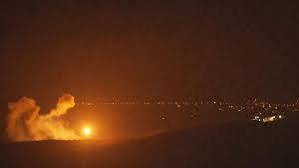Explosions on the Israel-Lebanon Border: Context and Implications
In recent weeks, the Israel-Lebanon border has witnessed a series of explosions that have heightened tensions in an already volatile region. These incidents, marked by loud detonations and subsequent military responses, underscore the precarious nature of security in the area, raising concerns about escalating conflicts and regional stability.
Background of the Tensions
The Israel-Lebanon border has a long and contentious history, deeply rooted in political, territorial, and sectarian conflicts. The primary actor on the Lebanese side is Hezbollah, a militant group backed by Iran, which emerged as a significant force during the Lebanese Civil War and has since positioned itself as a key player in the broader Iranian strategy in the region.
Since the 2006 Lebanon War, the border area has remained a hotbed of conflict. Periodic skirmishes, rocket attacks, and cross-border shelling have become common, often spurred by political developments or military operations. Hezbollah's arsenal has reportedly expanded significantly, and the group is known for its aggressive posture toward Israel, viewing it as an existential threat.
Recent Incidents
The explosions that have recently echoed across the border were reportedly linked to clashes between Israeli Defense Forces (IDF) and Hezbollah operatives. Witnesses on both sides described the sounds of blasts followed by heavy military responses, including artillery fire and aerial reconnaissance.
In one notable incident, a series of explosions were reportedly caused by IDF airstrikes targeting Hezbollah positions. Israeli military officials stated these operations aimed to thwart planned attacks and disrupt the group's operational capabilities. In response, Hezbollah threatened retaliation, a stance that could lead to further escalation.
Political Implications
The current situation is exacerbated by a series of political developments in both Israel and Lebanon. In Israel, the ongoing political instability, characterized by frequent elections and coalition shifts, has influenced military decisions and responses to threats. Prime Minister Benjamin Netanyahu's government has often taken a hardline stance against Hezbollah, seeking to demonstrate strength to both domestic and international audiences.
In Lebanon, the political landscape is equally fraught. The country is grappling with a severe economic crisis, compounded by a lack of effective governance. The Lebanese state has struggled to assert control over Hezbollah, which operates with a level of autonomy that challenges the central government's authority. This dynamic complicates the potential for diplomatic solutions and fosters an environment where military engagement may seem like the only option.
The Humanitarian Aspect
Beyond the immediate military concerns, the ongoing tension poses significant humanitarian challenges. Civilians living near the border face constant uncertainty and fear. Communities in both Israel and Lebanon are often subjected to rocket fire and retaliatory strikes, leading to casualties and displacement.
Moreover, the infrastructure in southern Lebanon, already strained by years of conflict, is further jeopardized by military operations. Humanitarian organizations have warned that the repercussions of renewed hostilities could deepen the existing crises, especially in areas where civilians are caught in the crossfire.
Regional and International Responses
The international community is closely monitoring the situation, given its potential to destabilize not only Lebanon and Israel but also the broader Middle East. The United Nations Interim Force in Lebanon (UNIFIL) has called for restraint and dialogue, emphasizing the need to prevent further escalation.
The involvement of regional powers, particularly Iran and Syria, adds another layer of complexity. Iran's support for Hezbollah and its role in the region's geopolitics often complicate international diplomatic efforts aimed at resolving the conflict. Meanwhile, Israel's relationships with other regional actors, particularly in the context of normalization agreements with Arab states, also influence its military strategies and diplomatic approaches.
Conclusion
The explosions along the Israel-Lebanon border serve as a stark reminder of the fragility of peace in the region. With both sides on high alert and engaged in military posturing, the potential for miscalculation remains significant. As local communities brace for the consequences of renewed hostilities, the need for diplomatic engagement and conflict resolution becomes ever more urgent.
Ultimately, the situation underscores the importance of addressing the underlying political, economic, and social issues that fuel tensions in the region. Without a concerted effort to foster dialogue and understanding, the cycle of violence is likely to continue, with devastating effects for civilians caught in the crossfire.



